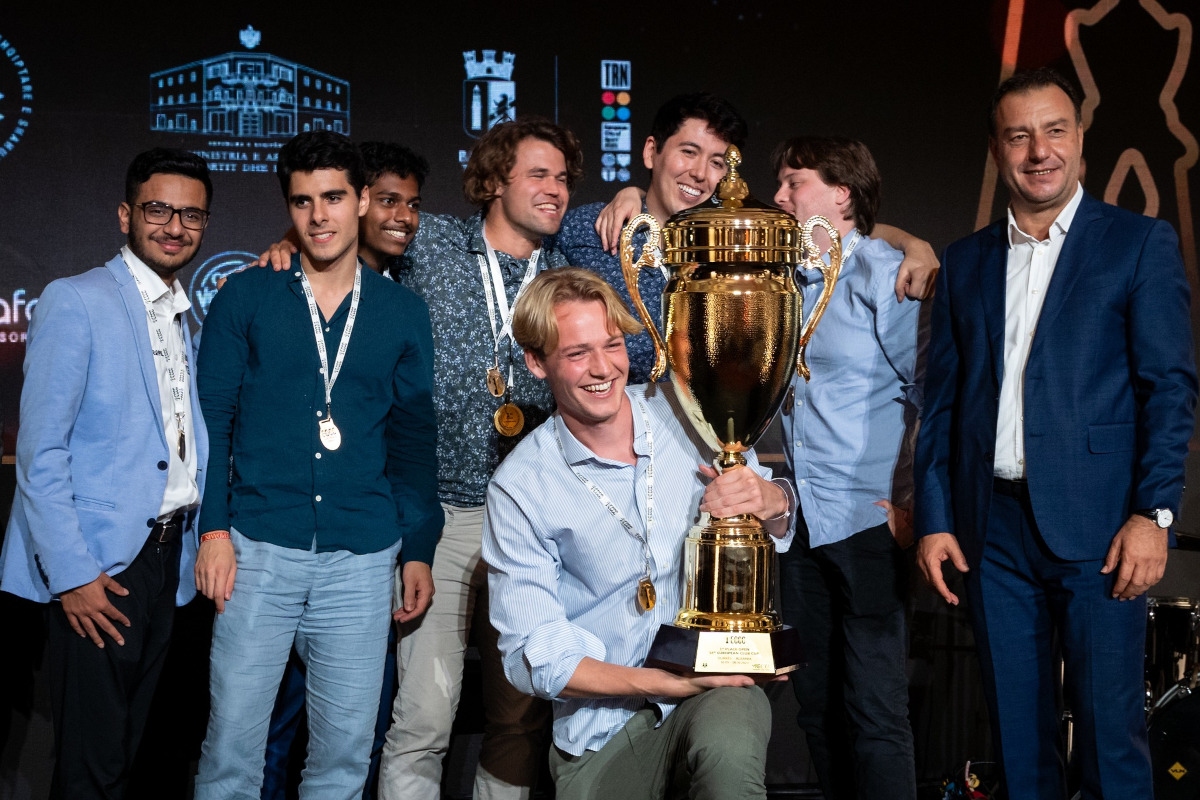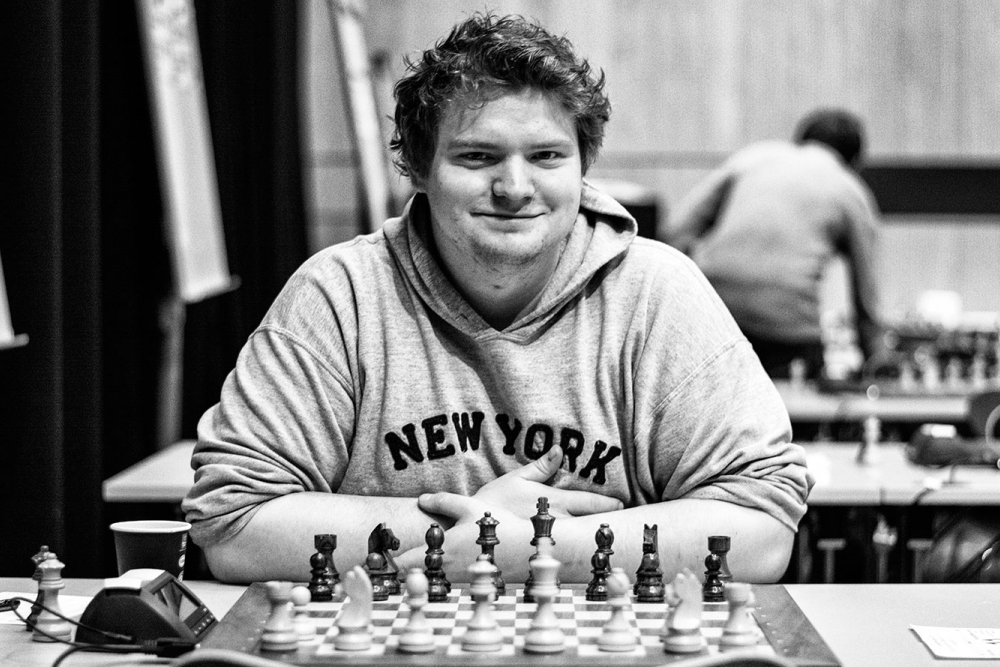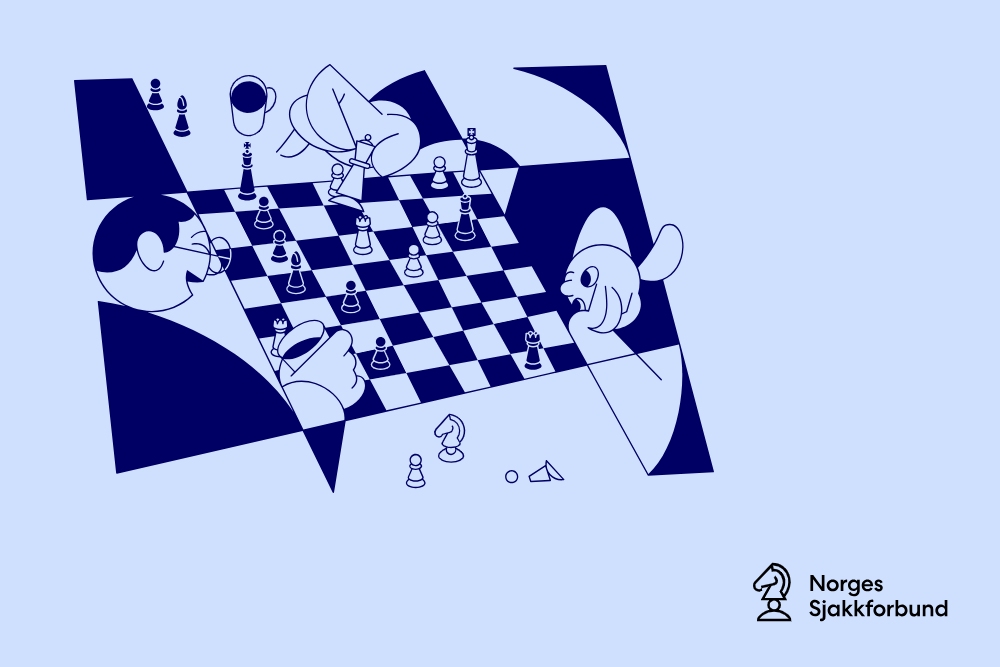The Norwegians probably wouldn’t have been able to get their top player Magnus Carlsen to Batumi – the world’s best chess player has just become a father and his mind is probably not on chess at the moment – but even without Carlsen, the Norwegians would have been able to field a strong team. Behind Carlsen, Johan-Sebastian Christiansen (born 1998, Elo 2661) is currently number two. He is followed by Aryan Tari, Jon Ludwig Hammer and the young Elham Amar (born in 2005), Norway’s greatest talent at the moment, ahead of the indestructible Simen Agdestein and Frode Urkedal, also seasoned grandmasters of international class. In addition, the Norwegian Chess Federation has ten other grandmasters and several talented international masters who could also play for the national team.
Aryan Tari | Photo: FIDE
On X, Aryan Tari expressed his regret at the absence of a Norwegian team from this event.
Yesterday the European Team Championship started in Georgia, but sadly without team Norway. It’s heartbreaking that a nation with the world’s best player for 15 years can’t find the budget to send its top players to compete
— Aryan Tari (@aryan_tari) October 6, 2025
He will certainly not be the only player to regret the Norwegian team’s absence from this major chess tournament featuring Europe’s best players.
However, the reason for the Norwegians’ non-participation is simply that the Norwegian Chess Federation cannot afford to send its players to the European Team Championship.
Regarding the cancellation of the European Team Championships, the Norwegian Chess Federation stated on its website:
The Top Chess Committee has decided to forgo the European Championship in favour of investing more heavily in the Olympic Games.
The committee has an annual budget of 200,000 Norwegian kroner* from the Norwegian Chess Federation. Previously, these funds were allocated to the European Team Championship and the Olympic Games.
However, after conducting a thorough survey of Norway’s top players, we have decided that we do not want to use these funds to participate in the 2025 European Team Championship.
We believe that the funds could be put to better use to benefit Norwegian top-level chess.
Based on this, we are planning an ambitious commitment to the 2026 Olympiad. This involves appointing a dedicated national coach for the women’s team and offering more tournament support to open class players.
* 200.000 Norwegian crowns = ca. 17.000 Euro
One would think that in a country where such an outstanding player as Magnus Carlsen grew up, sponsors would be lining up to support chess ventures, but this is not the case. It is still true to a certain extent that when Magnus Carlsen himself is involved, Norwegian television stations fight for the broadcasting rights and show his games live on TV, but when the former world champion is not personally present at chess events, public interest in chess in Norway drops significantly.
However, the Norwegian Chess Federation is also affected by structural and organisational problems. While chess federations in many other countries are organised under an umbrella sports association, this is not the case in Norway. The Norwegian Chess Federation is not one of the sports associations in the Norges Idrettsforbund og Olympiske og Paralympiske Komité (Norwegian Sports Federation and Olympic and Paralympic Committee). The Football Association and the Ski Association are the largest member associations, with over 300,000 and 160,000 members respectively. The Association of Company Sports is also significant. Other member associations include organised Frisbee players and dog handlers. With just over 700 members, the Softball and Baseball Association is the smallest association.
However, the Norwegian Chess Federation, founded in 1914, is not one of the sports associations organised here. This is because Norway has very strict regulations governing children’s sports for children under the age of 12. For example, children are not allowed to compete against adults. In chess, however, the conditions are different from other sports, and comparisons between adults and children in terms of equal opportunities make perfect sense. In order to avoid being restricted by the strict regulations on children’s sports, the Norwegian Chess Federation has decided not to join the sports association – which does not mean that children do not also receive special protection here under the regulations on children’s sports.
The withdrawal has immediate financial consequences, as it means that the chess association does not benefit from the state’s sports funding.
Let our authors show you how Carlsen tailored his openings to be able to outplay his opponents strategically in the middlegame or to obtain an enduring advantage into the endgame.
In 2019, Magnus Carlsen attempted to bring more money into Norwegian chess with the help of an advertising contract with the betting company Kindred. The proposal was controversially discussed in the Norwegian Chess Federation and then rejected after a vote. Carlsen had tried to gain majority support for his proposal by founding his chess club Offerspill, but to no avail.

Offerspill wins the European Club Cup 2023 | Photo: Niki Riga
Upon request, the President of the Norwegian Chess Federation, Lasse Østebø Løvik, explained the financial situation in Norwegian chess.

Lasse Østebø Løvik | Photo: Sjakk.no
It’s a shame that Norway does not take part in this year’s European Team Championship. Many people would have liked to see the Norwegian team there. This decision was made based on financial priorities and a survey of our top athletes. It was decided that the funds should be used for other measures. The downgrading of the European Team Championship is part of a larger initiative for the 2026 Chess Olympiad. This also gives the federation the opportunity to support several of our top players in other international championships, including the World Blitz and Rapid Chess Championships, which take place during the Christmas season.
The Norwegian Chess Federation has recently undergone a restructuring and appointed a new board, and we are actively working to ensure a more stable and sustainable economy for Norwegian chess in the future. We understand that this decision will provoke reactions among top players, but at the same time we must keep the entire organisation in mind. The majority of members are amateur players, and a significant portion of the federation’s funds already goes to elite sport. Unfortunately, this is a situation that many similar organisations are likely to be familiar with.
We hope that Norwegian chess will emerge financially stronger from the new structure and the ongoing work. Then we will be able to largely avoid such difficult prioritisation in the future.
